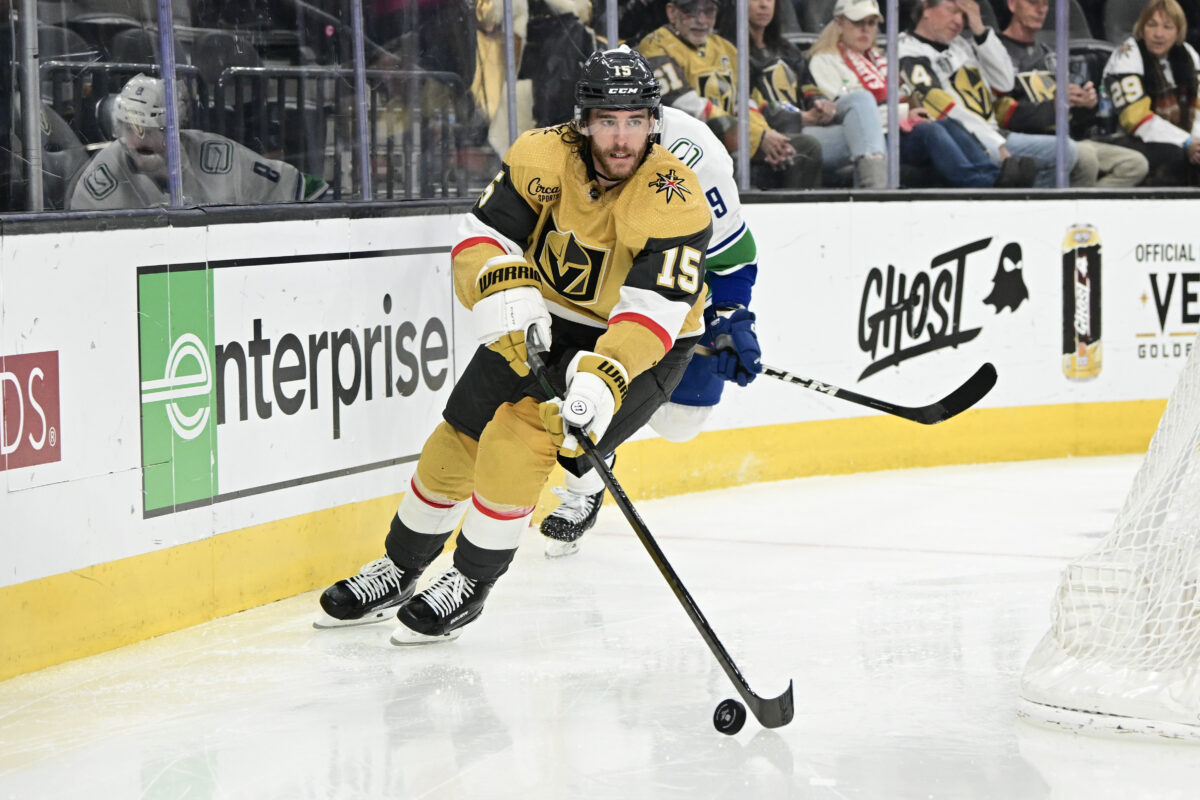The Vegas Golden Knights announced Thursday afternoon that Noah Hanifin had agreed to an eight-year, $58 million extension. The first six years will have a full no-trade clause, while the final two years will have a 15-team no-trade clause.
The Golden Knights acquired Hanifin on March 6 in a three-team trade with the Calgary Flames and Philadelphia Flyers, where the Golden Knights sent out a 2024 fifth-round pick, a 2025 third-rounder, and Daniil Miromanov to acquire Hanifin with 75 percent of his cap hit retained between the two franchises.
Related: Golden Knights Sign Noah Hanifin to 8-Year, $58 million Extension
Before getting into the ripple effects that this extension will cause, it’s important to note that this is still a great deal for the Golden Knights. For a 27-year-old defenseman coming into his prime who plays heavy minutes in all situations, this signing is more than a bargain.

Hanifin arguably would’ve been the biggest name in the free agency pool this summer, and the Golden Knights were able to get him at a great price. Also considering the aging defensive core, having Hanifin locked up long-term allows the Golden Knights to maintain this competitive window for much longer than expected.
What’s Next for the Golden Knights?
As of now, the Golden Knights will enter the offseason with 18 players under contract for 2024-25 with approximately $7.59 million in cap space. This accounts for Robin Lehner being left on long-term injured reserve (LTIR) as well as the league’s salary cap being projected to jump to $87.7 million.
Forwards:
- Jack Eichel – $10 million
- Mark Stone – $9.75 million
- Tomas Hertl – $6.75 million
- William Karlsson – $5.9 million
- Ivan Barbashev – $5 million
- Nicolas Roy – $3 million
- Brett Howden – $1.9 million
- Keegan Kolesar – $1.4 million
- Paul Cotter – $775,000
Defensemen
- Alex Pietrangelo – $8.8 million
- Noah Hanifin – $7.35 million
- Shea Theodore – $5.2 million
- Brayden McNabb – $2.85 million
- Zachary Whitecloud – $2.75 million
- Nicholas Hague – $2.294 million
- Ben Hutton – $975,000
Goalies
- Adin Hill – $4.9 million
- Logan Thompson – $766,000
- Robin Lehner – $5 million (LTIR)
With six pending unrestricted free agents (UFAs) and three restricted free agents (RFAs), the Golden Knights’ offseason just got a lot more complicated. Jonathan Marchessault has still not received a contract extension, and after a career year, he might have priced himself out of the Golden Knights’ budget. Chandler Stephenson, Anthony Mantha, Mike Amadio, William Carrier, and Alec Martinez round out the rest of the UFA list, and Pavel Dorofeyev, Kaeden Korczak, and Jiri Patera are the RFAs.
It seems like many of the deals that the Golden Knights have made over the past few seasons are beginning to catch up to them. Considering that most of these free agents are due for a raise, general manager (GM) Kelly McCrimmon will have to decide which players are worth keeping and at what price they can afford to keep them.
Golden Knights’ Potential Offseason Moves
In order to better position themselves for the future, the Golden Knights are likely going to trade away some players who might not have initially been on the table.
Shea Theodore is someone that most Golden Knights fans would’ve never considered trading, but given his injury history and team-friendly contract, he could be one of the players that they decide to move on from. Hanifin may not provide the same dynamic offensive game that Theodore does, but there isn’t anyone that would be considered ‘moveable’ on their defensive core that would give them a better return, while also clearing up cap space.
The Golden Knights will likely sign only one of Amadio or Carrier, with Amadio having the edge. They both provide similar value to the middle-six, but Amadio has been able to play a much larger role in the lineup with Carrier’s injuries, and would likely cost less to retain.
The rest of the forward pool of free agents will entirely depend on Marchessault’s future. While Stephenson and Mantha may have once been considered certainties to hit the open market after the Golden Knights acquired Tomas Hertl, they will be much more inclined to keep one or both of them if Marchessault decides to leave.
Final Thoughts
While Golden Knights fans should be happy with this extension, it’s hard to ignore the tough decisions that are going to have to be made in order for this team to stay cap-compliant. With the cap projected to increase significantly over the next year, this allows them a bit more flexibility, but that doesn’t mean that the Golden Knights roster won’t have a different look in 2024-25.
The Golden Knights have pioneered a new way of managing an NHL team in the salary cap era, and this offseason will be the ultimate test to see if their style is sustainable.
